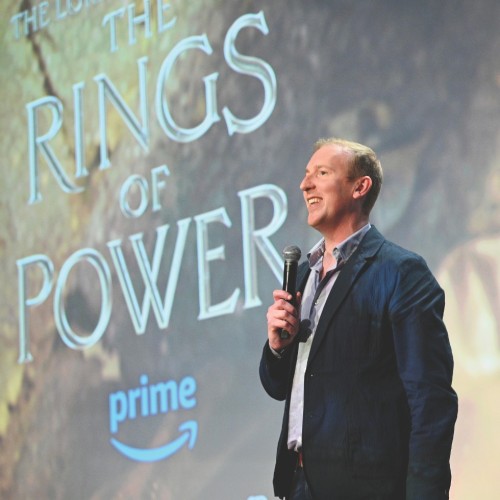
Patrick McKay ’03 by Jason Bell
A Fellow of the Ring
After years climbing the Hollywood hills, Patrick McKay ’03 has made a name for himself as showrunner of Amazon’s "The Lord of the Rings: The Rings of Power."
The Lord of the Rings character Boromir famously noted that “one does not simply walk into Mordor,” the realm of the Dark Lord Sauron. The same can be said about the entertainment industry, where Patrick McKay ’03 has spent the better part of two decades building a career as a screenwriter. “It’s a difficult path,” he said. “Essentially, you’re aspiring to climb Mount Everest. People can climb it, but many freeze to death on the way up or never even make it to the mountain to begin with.”
McKay is one of the few to survive the ascent. The alumnus and his longtime collaborator J.D. Payne currently serve as co-showrunners of The Lord of the Rings: The Rings of Power. The pair oversee all aspects of production and maintain creative control over the Amazon Prime series.
Amid production on the sprawling fantasy series, the second season of which wrapped up in October 2024, McKay spoke to Stonehill Alumni Magazine from London and traced his journey to Middle-earth.
A Vote of Confidence
Unlike Lord of the Rings protagonist Frodo Baggins, McKay’s quest did not begin in the Shire, home of the hobbits. Rather, his story started in McLean, Virginia, just outside of Washington, D.C., where he and Payne met in eighth grade and soon began writing together. Though he grew up nearly 500 miles from Stonehill, McKay was no stranger to the Easton area. His father was raised in nearby Attleboro, while his mother spent her high school years in Newport, Rhode Island.
“I always felt strong ties to New England and the Boston area in particular,” he said. “I knew I wanted to go to school there and study liberal arts as close to Fenway Park as possible. That narrowed my circle, so that’s how I ended up at Stonehill.”
McKay majored in communication and minored in English, but his experiences with theater were “the core of his experience” at the College. The writer recalls that his years studying under Professor Patricia Sankus, former chair of the Theatre Arts Department and recipient of the Louise F. Hegarty Award for Excellence in Teaching, were particularly impactful. He said she worked hard to create “a unique oasis of creative energy” at Stonehill in which students could flourish.
When asked how she remembers McKay, Sankus noted that his intellectual and emotional interests in theater were clear to her from the minute he arrived on campus. “He performed a number of different roles in a variety of plays, giving each careful thought and concentrated energy,” she said.
McKay’s talent for writing became especially apparent to Sankus when his play, A Kite, was selected to be presented at the John F. Kennedy Center for the Performing Arts as part of its American College Theater Festival in April 2002. The 10-minute drama follows three characters in conflict over the titular object.
This opportunity to present his work during his junior year offered McKay a “vote of much-needed confidence” that carried him through his days as an aspiring screenwriter. “If I didn’t have [experiences like that at Stonehill], I can’t imagine I would’ve ever considered pursuing anything close to this as a career,” he said.
Twenty-some years ago, I was a kid at Stonehill who was over the moon to have written a 10-minute play that a few people said they liked. I strive every day to remember that honing the craft and working to entertain others above all else is what it’s all about.
A Positive Spirit
After graduating and having completed several original screenplays with Payne, McKay was determined to break into the entertainment industry. Like many people fresh out of college, his path to achieving his goals was nonlinear. Moving back to the D.C. area following Commencement, he worked in political communications and marketing while earning a master’s degree in creative writing from American University. “I basically was terrified of having to get a ‘real job,’” he said. “I did everything I could to bide my time.”
After his and Payne’s seventh original screenplay helped them secure agency representation in Hollywood, McKay could bide his time no longer. He moved to Los Angeles with few industry contacts, something that could have been his downfall in a town where livelihoods are built upon knowing the right people. Today, however, McKay thinks having high-powered connections isn’t everything.
“The one thing you have control over is how hard you work, and I became determined to work harder than everyone else who was 25 and also aspired to write movies,” he said. “I consider myself extremely fortunate to have had a partner who was just as driven as I was.”
Indeed, McKay believes the most beneficial thing about his decades-long collaboration with Payne is how well their skill sets complement each other. “[J.D. has] always had a real ear for the emotionality of storytelling, the poetry of dialogue and the written word,” he said. “He can come up with these grand, imaginative ideas, while my own talents lean more toward mechanical, formal things. I like to think I’m not too bad at narrative structure and the visual aspects of film storytelling, and I think I have a good critical eye for what’s working and what’s not in a project.”
Throughout their time in Tinseltown, the pair have experienced various highs and lows. They have had the privilege of developing scripts focused on properties most writers only dream of getting their hands on, including Flash Gordon, Star Trek, Godzilla and others. Unfortunately, many of the projects they worked on were eventually abandoned by their respective studios or redeveloped by other writers, both common occurrences in movie making.
Showrunners Patrick McKay ’03 and J.D. Payne have been writing together since they were in middle school. [Photo by Ben Rothstein]
Things began looking up for the duo in 2017, when Amazon announced plans for a Lord of the Rings series that executives hoped would rival HBO’s Game of Thrones in terms of production value and viewership. Before cameras started rolling, the company spent months searching for the right creative partners to help steer the ambitious project.
Over the course of many meetings, McKay and Payne pitched the idea of setting the show during Middle-earth’s Second Age, a fabled part of the Lord of the Rings mythology that author J.R.R. Tolkien called his “legendarium.” Despite having fewer credits than many of their competitors, the writers won over the powers that be with their vision for the series, as well as their love of all things Rings.
“Hearing them bounce back and forth, they had such a deep connection to the material that was there from the beginning. There was no education you could do for that; it was their natural organic interest,” said Jennifer Salke, former head of Amazon Studios, in a 2022 interview with The Hollywood Reporter.
Upon being handed the keys to the kingdom, McKay and Payne fleshed out their idea for the series alongside an army of trusted collaborators, including writers, directors, production designers, visual effects specialists and countless others. Their efforts eventually brought them to New Zealand, where production on their show’s first season took place from winter 2020 to summer 2021 (with a pandemic-related pause in between).
The Lord of the Rings: The Rings of Power debuted on September 1, 2022. According to Amazon, the series was watched by 25 million global viewers in its first 24 hours on the platform and has since reportedly become the streaming service’s most-watched original series. With more eyes on their work than ever before, McKay said he and Payne feel the weight of fans’ expectations every day.
“We’re human and fallible, like anybody, but you have to avoid falling into the trap of second-guessing yourself and just focus on the work,” he said. Recognizing that the negative voices in his head are not helpful, McKay said he and Payne aspire to craft a show with a “positive spirit” that, true to Tolkien, serves as an antidote to cynicism, as well as to series and films that he worries “focus solely on our worst impulses as people.”
“That’s not the world I live in,” he said. “Those aren’t the people I know. Those aren’t the values that so many incredible mentors at Stonehill and elsewhere instilled in me. I like to believe that at the end of the day people are actually pretty good, and they do try to help each other, even in dire circumstances. I’m drawn to Tolkien’s work in part because he felt the same way.”
What It’s All About
When McKay spoke to Stonehill Alumni Magazine, he, Payne and their team were deep in production on the second season, determined to “raise the bar in every respect,” especially considering that season one was produced during the height of COVID.
“We were making this grandly ambitious thing at a time of such instability in the world,” McKay said. “That was very challenging at times. We feel incredibly grateful to make a second season after all that adversity.” In February, Prime Video announced that the show would return for a third season.
Though McKay is currently living out his dream of telling stories that he hopes are meaningful to viewers, he recognizes that his job has the potential to become all-consuming if he lets it. “When you’re making a show like this, you’re essentially running a company with thousands of employees,” he said. “You’re living day in and day out making hundreds of decisions, and it’s important not to get lost in your own bubble.”
How exactly does a showrunner do that? McKay believes that remembering where his journey began is a good place to start. “Twenty-some years ago, I was a kid at Stonehill who was over the moon to have written a 10-minute play that a few people said they liked,” he said. “I strive every day to remember that honing the craft and working to entertain others above all else is what it’s all about.”
Scenes from "Lord of the Rings: Rings of Power"
Courtesy of Prime Video, Ben Rothstein, Ross Ferguson.
Stonehill Alumni Magazine
Spring 2025


